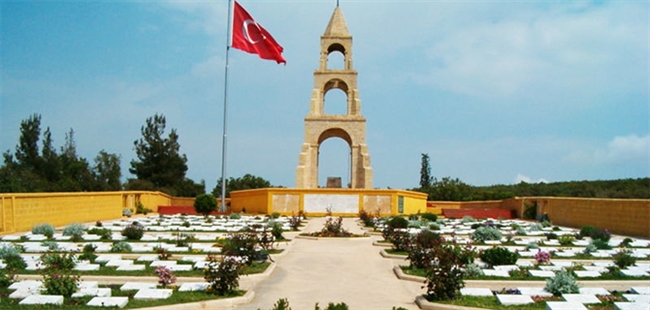
About Gallipoli, Turkey
About Gallipoli, Turkey
The Gallipoli campaign took place between April and December 1915 in an effort to take the Dardanelles from the Turkish Ottoman Empire (an ally of Germany and Austria) and thus force it out of the war. Some 60,000 Australians and 18,000 New Zealanders were part of a larger British force. Some 26,000 Australians and 7,571 New Zealanders were wounded; and 7,594 Australians and 2,431 NZs were killed. In numerical terms Gallipoli was a minor campaign but it took on considerable national and personal importance to the Australians and New Zealanders who fought there.
The Gallipoli Campaign was Australia's and New Zealand's introduction to the Great War. Many Australians and New Zealanders fought on the Peninsula from the day of the landings (April 25, 1915) until the evacuation of 20 December 1915. The 25th April is the New Zealand equivalent of Armistice Day and is marked as the ANZAC day in both countries with Dawn Parades and other services in every city and town. Shops are closed in the morning. It is a very important day to Australians and New Zealanders for a variety of reasons that have changed and transmuted over the years.
Some Words About the War in Gallipoli / Turkey
Kemal Ataturk; (Inscription on Gallipoli Memorial put up by Turkey in 1934, also on Ataturk Memorial at Tarakina Bay, Wellington.)
"Those heroes who shed their blood and lost their lives, you are now lying in the soil of a friendly country. Therefore rest in peace. There is no difference between the Johnnies and the Mehmets to us where they lie side by side in this country of ours. You, the mothers who sent their sons from far away countries wipe away your tears, your sons are now lying in our bosom and are in peace. After having lost their lives on this land they become our sons as well."
Russell Weir; (Tolerton, In the shadow of war p. 202)
"We landed, I suppose, somewhere about nine or half past nine in the morning. On the Sunday morning, Sunday the 25th of April. And through a mistake made by the navy, we played into the Turk's hands beautifully. Because you can imagine a narrow strip of beach, nothing but stones, no sand, and from that narrow stretch of beach straight up were high cliffs composed of clay and rock. And the Turks had the machine guns and the rifle fire and the full view of the beach, and the only protection we could get when we advanced was to get in close to the cliff and hug it."
Alexander Aitken; (Aitken, Gallipoli to the Somme p. 33-34)
"... I slid the rifle-sight to '450', aimed and fired.[...] The Turk plunged into the trench in a swirl of dust ... This, of course, was what I was there for, but it seemed no light matter, and kept me awake for some time. I would come to no conclusion except that individual guilt in an act of this kind is not absolved by collective duty nor lessened when pooled in collective responsibility. I further found that I bore the Turk no trace of enmity - nor for that matter did any of us; he was to us "Johnny Turk" or "Joe Burke", almost a fellow sufferer. We were not indoctrinated against him, as we had been against the Germans by propaganda, the cartoons of Louis Raemakers, and tales of atrocity. But I saw, still further, that this Turk, at the moment of shooting, had not even been a person; he might have been big game. It was a single step to the thought that certain 'colonial' campaigns, not infrequent in our annals, might have been conducted in almost this game-hunting spirit. Here I balked; to become analytical might lead to doubt of the cause for which we were fighting; for this had been called, in those early years, the 'war to end war'. I was far from such doubt then, and would have repudiated pacifism."
Major General Godley; (in a letter to the NZ Minster of Interior, Ronald Graham, July 1915, Boyack p. 59)
"I hear that Winston [Churchill] has arrived, and suppose we shall see him within the next few days. He certainly is a plucky fellow, and I think he ought to be given a V.C. and then taken out and shot. I wonder what sort of reception he will get if he comes among the troops, whether they will cheer, or shoot him. I think the former."
